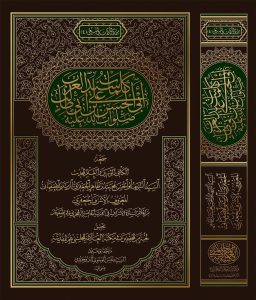
Kalimāt Sayyid al-ʿArab Abī al-Ḥasan ʿAlī ibn Abī Ṭālib (a) is a newly published work by the 4/5th century scholar al-Sharīf Abū al-Ḥasan Muḥammad ibn Ṭāhir al-Jaʿfarī al-Zaynabī al-Isfahānī (also known as al-Ashraf al-Jaʿfarī). It was published by al-ʿAllāmah al-Majlisī Library in Qum. Being similar to Nahj al-Balāghah and written in Iran in about the same time period as the latter, its author was one of the scholars of Isfahan, but little is known about him. This is because he is not mentioned in the known biographical and biobibliographical works. His name is seen, however, in some books on genealogy and among some chains of narrators, and within the biographies of other individuals. Nonetheless, his works are not mentioned even in these secondary sources. A unique manuscript of this work was found in the Hagia Sophia library in Turkey and was then edited and published recently.
There are many merits in the published critical edition, primary among which is the detailed annotation which includes all the sources where the traditions are mentioned, starting from Nahj al-Balāghah itself, followed by those that contain chains of transmission (musnad), and those that don’t (mursal), and even sources where the same meaning (maḍmūn) is found, albeit paraphrased. The editor even records sources where a statement is found attributed to other than Amīr al-Muʾminīn (a). Since there is only one extant manuscript of the text, it could not be compared to other manuscripts as is usually done with critical editions. As such, the editor used other early texts from around the same period, or known classical texts that contain similar wordings, in order to identify any errors in the manuscript and then made a note of the same in the footnotes. In all, this is a well-researched work and definitely counts as a good critical edition of an obscure, and previously unknown and unpublished, work.
The published book has 788 pages, and a group of scholars worked together to edit the work under the supervision of al-Sayyid Ḥasan al-Mūsawī al-Burujerdī. The actual text is 477 pages with the rest consisting of introductory discussions and appendices, some of which are quite useful. It has a total of 661 aphorisms, letters, and sermons of the Imam, arranged in no specific order. In his preface, al-Sayyid Ḥasan al-Burujerdī describes how he came upon this manuscript and notes that despite searching all the available catalogues of the different manuscript libraries around the world, he was unable to find any other manuscript of this work. He says that this work may have been authored before Nahj al-Balāghah since the author lived at the same time; but in any case, there is no possibility of its author having knowledge of the existence of Nahj al-Balāghah, even if he compiled this work a few years later. The manuscript he found had been written in the year 754 AH by a Sunnī, Sūfī copyist from the original manuscript written during the lifetime of the author himself (and now lost).
The author of this work states in his own introduction that the purpose behind writing this text was in response to a request by someone for a book in which all the otherwise scattered statements of Amīr al-Muʾminīn may be compiled together – something that did not exist at that time. What makes this text more special is that it contains about 40 traditions from the Imam that are not found in any other source. It also has about 70 traditions that have similar meanings to what is currently present in some sources, but with noticeable difference in wording. Though technically the lack of chains of transmission and the dearth of knowledge about the author and the book itself means that its traditions are ‘weak’, it is still quite a treasure to be found so late. Indeed, this makes up one of the best examples of wijādah to date. The author, al-Ashraf al-Jaʿfarī was born around 370 AH and he passed away around 440 AH, though the exact dates are not known. Likewise, nothing is known about his creed, except that some of the passages of this work give us confidence that he was indeed an Imāmī Shīʿah.
It is hoped that we will get the tawfīq to do an in-depth analysis of the ‘new’ aḥādīth in this work and present our findings in a research article in the not-too-distant future, God-willing. And indeed Allah is the granter of success.




